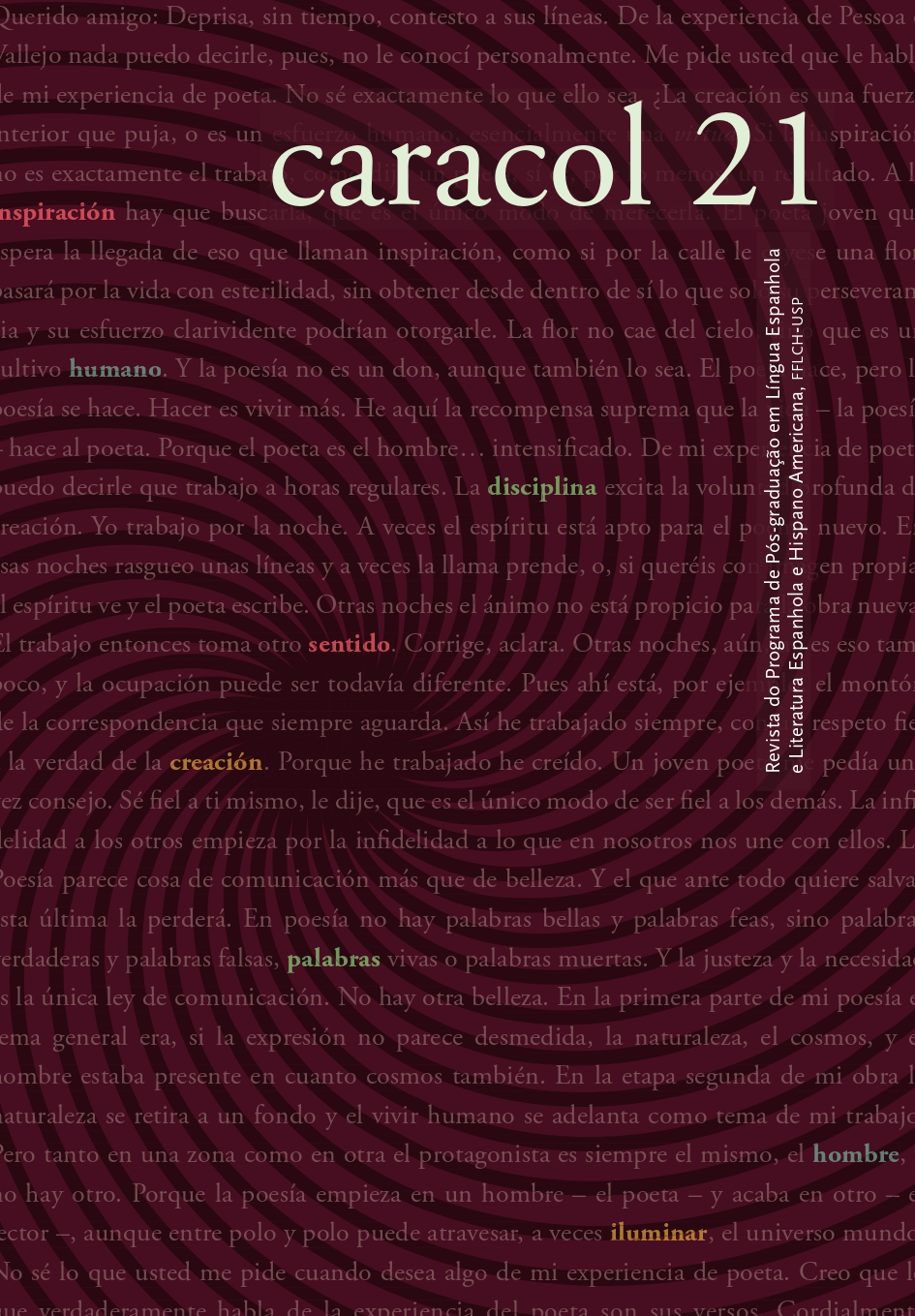Laboratory of rewrites and interscripts: appropriate poetics in Debajo de la Lengua (2009), by Héctor Hernández Montecinos
DOI:
https://doi.org/10.11606/issn.2317-9651.i21p404-429Keywords:
appropriation, rewriting, inter-writing, Héctor Hernández MontecinosAbstract
Héctor Hernández Montecinos (1979), an author belonging to the so called generation of Novísimos Chilean poets, as a recurring mechanism he practices the appropriation as a technique, essentially in his work Debajo de la lengua (2009), which contains more than 250 rewritings of Latin American authors. In it, demarcating a network of relations with which he appropriates, coauthoral procedures are developed for the construction of an archive of sources from Latin American poetry of the XX and XXI century. This work intends to do a review of the poetics of Hernández Montecinos based on the analysis of appropriation as rewriting, employing the notions put forth by Cristina Rivera Garza (2013) and Agustín Fernández Mallo (2018). In this sense, we inquire into the recurrent self-reflection carried out by rewriting of the work, especially emphasizing in the coauthoral processes gestated in section “El Secreto de mi mano” in Debajo de la lengua, denominated as inter-writings, where a textual exchange and intervention is exercised between Héctor Hernández Montecinos and the poets: Ernesto Carrión, Manuel Barrios, Allan Mills, Paula Ilabaca y Yaxkin Melchy, in the pursuit of a collective poetic.
Downloads
References
Cussen, Felipe. Para una poética de la repetición. In: Meridional. Revista Chilena de Estudios Latinoamericanos, Chile, n. 5, pp. 41-58, 2015. Disponible en: <https://dialnet.unirioja.es/servlet/articulo?codigo=6066747>. Último acceso: 07/07/2019.
Goldsmith, Kenneth. Escritura no-creativa: gestionando el lenguaje en la era digital. Buenos Aires: Caja Negra, 2015.
Hernández Montecinos, Héctor. Debajo de la Lengua. Santiago: Editorial Cuarto Propio, 2009.
Hernández Montecinos, Héctor. La Divina Revelación. México D.F: Editorial Aldvs, 2011.
Hernández Montecinos, Héctor. ¿Por qué no reescribir? Brasil: Editora Medusa, 2017.
Hernández Montecinos, Héctor. Buenas noches luciérnagas. Santiago: RIL Editores, 2017.
Hernández Montecinos, Héctor. Para mí los libros de poesía son novelas. [Entrevista concedida a] Javier García. In: Culto, 5 sept. 2017. Disponible en: <https://culto.latercera.com/2017/09/05/hector-hernandez-montecinos-poeta-chileno-mi-los-libros-poesia-novelas/>. Último acceso: 05/09/2019.
Montoya, Jesús. La R progresiva. In: Revista POESÍA, 2018, Universidad de Carabobo. Disponible en: <http://poesia.uc.edu.ve/la-r-progresiva/>. Último acceso: 07/03/2020.
Montoya, Jesús. Las reescrituras. In: Revista POESÍA, 2018, Universidad de Carabobo. Disponible en: <http://poesia.uc.edu.ve/las-reescrituras/>. Último acceso: 07/03/2020.
Perloff, Marjorie. O gênio não original: poesia por outros meios no novo século. Belo Horizonte: Editora UFMG, 2013.
Rivera Garza, Cristina. (2013). Los muertos indóciles. Necroescrituras y desapropiación. Ciudad de México: Tusquets.
Downloads
Published
Issue
Section
License
Copyright (c) 2021 Jesús Alexander Montoya Omaña

This work is licensed under a Creative Commons Attribution-NonCommercial 4.0 International License.
Authors who publish in this journal agree to the following terms:
- Authors retain copyright and grant the journal the right of first publication, with the work simultaneously licensed under a Creative Commons Attribution License, which permits the dissemination of the work with recognition of authorship and initial publication in this journal.
- Authors are allowed to enter into additional contracts separately for non-exclusive use of the version of the work published in this journal (such as publication in an institutional repository or as a book chapter), with recognition of authorship and initial publication in this journal.
- Authors are allowed and encouraged to publish and distribute their work online (e.g., in institutional repositories or on their personal page) at any point before or during the editorial process, as this can generate productive changes, as well as increasing the impact and citation of the published work (see The effect of open access…).




